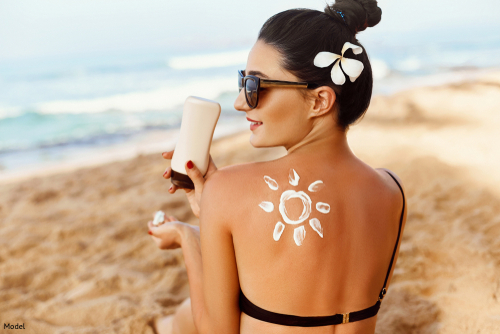One of the most important facets of sun safety is applying sunscreen whenever you plan to be outdoors. No matter what your favorite summertime activity is, you always need sunscreen to protect your skin from ultraviolet (UV) rays, even on cloudy days. Without it, you put yourself at risk for skin damage and may increase the likelihood of developing skin cancer later on in life. But with all the options available on the market today, it can be hard to know which sunscreen to choose for your skin type and skincare needs.
Let’s dig a little deeper into the differences between chemical and mineral sunscreens:
Mineral sunscreen
Also known as physical sunscreen, mineral sunscreen uses UV filters that sit on top of the skin, preventing UV rays from penetrating the skin’s surface. The mineral filters most commonly used in these sunscreens are titanium dioxide and zinc oxide.
● Common ingredients (titanium dioxide and zinc oxide) are proven to be safe and well-tolerated by all skin types, making mineral sunscreen suitable for children and those with sensitive skin.
● Mineral formulas are usually non-comedogenic and non-inflammatory, so they won’t clog pores or cause breakouts.
● Since mineral sunscreen creates a physical barrier, it takes effect as soon as you put it on.
● Ingredients are proven to be safe for reefs and marine life.
● Most mineral sunscreens may have a thick, heavy texture since the large mineral filter compounds sit on top of the skin and aren’t absorbed.
Chemical sunscreen
Unlike mineral sunscreen, chemical sunscreen allows UV light into the skin. Once the light is absorbed into your skin, the sunscreen’s UV filters transform it into heat, protecting your skin from sun damage. Common UV filters include oxybenzone, avobenzone and octinoxate.
● Chemical sunscreens are usually clear and gel-like, leaving no white streaks on the skin.
● Chemical sunscreens typically have a lightweight, gel-like and/or spray-on texture that’s easy to apply and comfortable on the skin.
● Chemical ingredients often provide more thorough sun protection than physical ingredients and are more effective at resisting water and sweat.
● Chemical sunscreens take about 20-30 minutes to absorb into the skin, so protection is not immediate.
● Ingredients included in chemical sunscreens may lead to allergic reactions in those with sensitive skin and may worsen rosacea or melasma.
● Ingredients typically found in chemical sunscreens are considered harmful to coral reefs and marine life in some states.
Which is ideal for your skin?
While there is some debate on the effectiveness of each type of sunscreen, the most important sun safety tip is to protect your skin with a formula you’ll actually enjoy wearing every day.
Whether you have darker skin, acne-prone skin, sensitive skin or a particular preference for a certain texture or ingredient, we can’t wait to help you find a sunscreen you’ll love! Call 303.327.7300 or today to get started.



